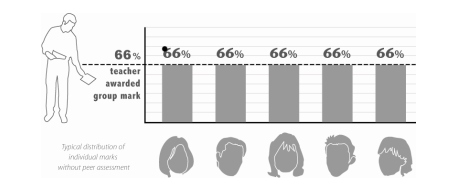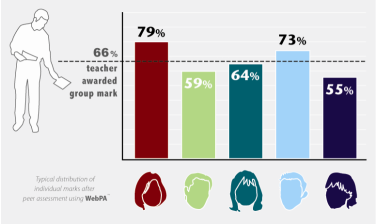UVLe LTI Packages: Difference between revisions
| Line 46: | Line 46: | ||
==Portfolio Page== | ==Portfolio Page== | ||
[[File:portfolio_chemvantage.png|300px|right]] | [[File:portfolio_chemvantage.png|300px|right]] | ||
Students can access their own | Students can access their own portfolios that show the score on each quiz and homework assignments they have taken up. The Portfolio page also provides a summary of all activities completed, including videos watched, quizzes taken and homework problems solved.<br/> | ||
Instructors can view the scores of each student within this tool or within the UVLe course gradebook. | Instructors can view the scores of each student within this tool or within the UVLe course gradebook. | ||
Revision as of 12:32, 10 October 2013
"LTI" stands for "learning tools interoperability," a standard for integrating rich learning applications for learning management systems like UVLe. To know more about tools that can be incorporated into UVLe, please see this catalog.
The LTI packages discussed in this page are already available on UVLe.
ChemVantage
The ChemVantage package provides resources that include online textbooks, video lectures, and class activities like homework exercises, quizzes and practice exams for General Chemistry. Here's its demo page on UVLe for students. If you want a teacher demo account, please contact our Helpdesk.
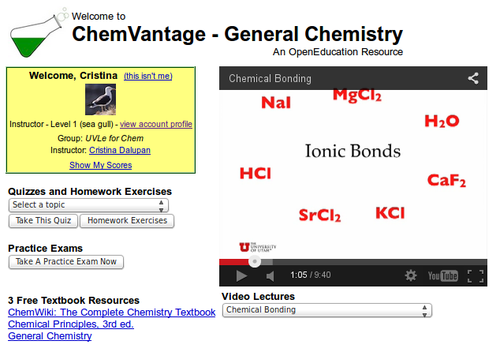
|
|---|
Quizzes
This LTI package enables UVLe and ChemVantage to communicate with each other. The quizzes taken by students using this tool will be added to their UVLe course gradebook automatically. Currently there are over 2000 Quiz questions. Each quiz consists of 10 questions drawn at random from its own question bank.
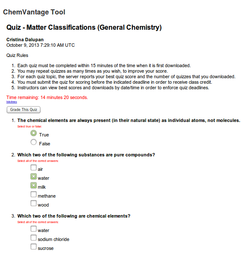 |
 |
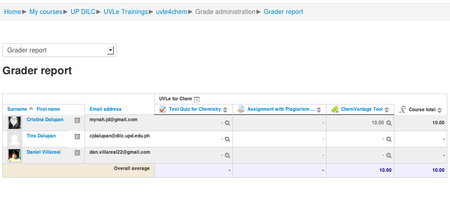 |
The students can have unlimited attempts on a particular quiz, and the highest score among the quiz attempts would be recorded on the course gradebook.
Video Lectures
It offers a series of 10-minute video lectures on a variety of General Chemistry topics (see listing above).
Practice Exams
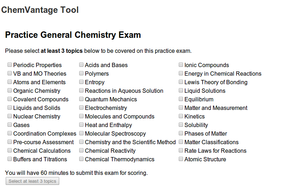
The practice exams allow students to choose from any group of 3 or more topics. The exam is designed to take for 1 hour and includes a selection of 10 easy questions, 5 average and 2 challenging problems. After the exam, the scores are disaggregated by topic to reveal the student's areas of strengths and weaknesses.
Portfolio Page
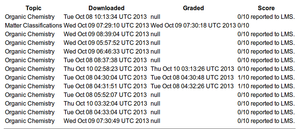
Students can access their own portfolios that show the score on each quiz and homework assignments they have taken up. The Portfolio page also provides a summary of all activities completed, including videos watched, quizzes taken and homework problems solved.
Instructors can view the scores of each student within this tool or within the UVLe course gradebook.
For UVLe faculty user: How to add ChemVantage on UVLe course
WebPA
WebPA (short for "web-based peer assessment") is an online automated tool that facilitates peer moderated marking of group work. Students carry out a group task set by the academic tutor and follow this by an assessment on the performance of the group. A ‘weighting factor’ is generated for each individual group member which is derived from each student’s input against defined criteria. Based on the total mark given to the group task, assessed and allocated by the academic tutor in the usual way, the weighting factor is then used to moderate marks providing an individual mark for each student.
Demo page on UVLe
Scales
WebPA have two different ways that your student can score each other.
- Likert scale
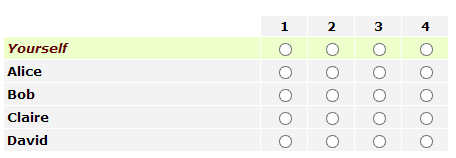
The standard WebPA scoring. Students rate each other against a small likert scale, typically 1-5 or 1-10, by simply clicking the appropriate radio button.
- Split 100

Students must split 100 marks between their teammates for each criterion, with each score being entered manually into the appropriate box. The score for each criterion must total 100, so students using this method will be made more aware of the effects of their peer assessment scores, as giving more marks to one team mate means another must get less.
Noteflight
Noteflight is a music composition and instruction tool.
For now this is a demo version; meaning, exercises cannot yet be saved. If we have enough users for this functionality, we may convert it to a full-fledged version.



